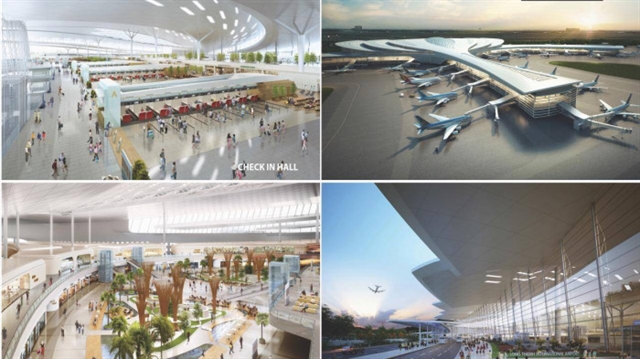 Economy
Economy

Việt Nam is looking to spend VNĐ400 trillion (US$17.65 billion) on upgrades to its airports from now until 2030, according to a proposal that the Ministry of Transport has submitted to the Government.

|
| Computer rendered images of the Long Thành International Airport. Construction of the airport, which can handle 25 million passengers a year once finished, has been set to begin in February next year. — Photo baochinhphu.vn |
HÀ NỘI — Việt Nam is looking to spend VNĐ400 trillion (US$17.65 billion) on upgrades to its airports from now until 2030, according to a proposal that the Ministry of Transport has submitted to the Government.
The country's top priorities included the Nội Bài International Airport in capital city Hà Nội, the Tân Sơn Nhất International Airport in in the southern economic hub HCM City and the under-construction Long Thành International Airport Đồng Nai Province (located some 40km to the east of HCM City).
In addition, 22 other airports across the country are to receive major upgrades while six new airports are to be built with an objective to bring Việt Nam's airport capacity to 278 million passengers a year, with 95 per cent of the population within a 100km radius of an airport.
The upgrades consist of advanced flight traffic management systems, maintenance hubs, logistics and pilot training centres.
The VNĐ400 trillion budget accounted for almost a quarter of the entire industry's investment by 2030, which is made up of money from the State budget and other sources of funding.
By the end of 2030, the country is to operate a network of 28 airports with Hà Nội and HCM City as two main transport hubs. The list of airports to receive infrastructure upgrades by then included international terminals Vân Đồn, Cát Bi, Nội Bài, Thọ Xuân, Vinh, Phú Bài, Đà Nẵng, Chu Lai, Cam Ranh, Liên Khương, Long Thành, Tân Sơn Nhất, Cần Thơ and Phú Quốc and domestic terminals Lai Châu, Điện Biên, Sa Pa, Nà Sản, Đồng Hới, Quảng Trị, Phù Cát, Tuy Hòa, Pleiku, Buôn Ma Thuột, Phan Thiết, Rạch Giá, Cà Mau and Côn Đảo.
After 2030, the Hải Phòng International Airport is to replace the old Cát Bi Airport in accordance to Prime Minister's Directive 640/2011/QĐ-TTg.
Meanwhile, surveys and studies on large islands such as Lý Sơn and Phú Quý are to be continued to assess whether the country should construct additional airports on said islands.
In another report, the ministry said by 2050 the capital city Hà Nội may require another airport to support the existing Nội Bài International Airport.
The ministry highlighted the importance of a number of key projects including the constructions of the Long Thành International Airport (25 million capacity a year once finished), T3 Terminal of the Tân Sơn Nhất International Airport ( to bring the airport's capacity to 20 million passengers a year once finished) and the expansion of T2 Terminal of the Nội Bài International Airport (15 million passengers a year).
A number of key policies related to the management of the country's airports are due to go under extensive reviews in an attempt to optimise their ability to generate income and maximise efficiency. Policymakers have said the country encourage the private sector to invest in airport infrastructure development and operation. — VNS